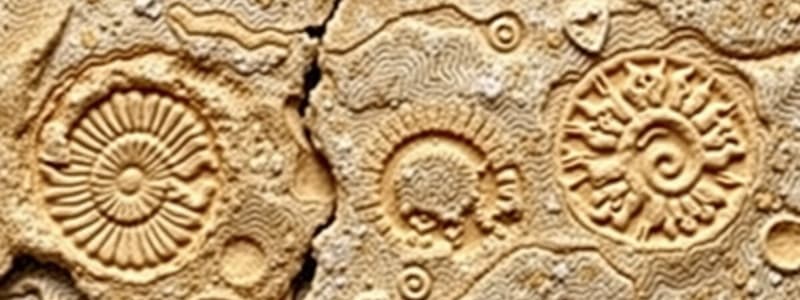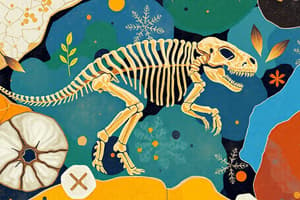Podcast
Questions and Answers
How do fossils form?
How do fossils form?
Most fossils form when living things die and are buried by sediments. The sediments slowly harden into rock and preserve the shapes of the organisms.
What are the different kinds of fossils?
What are the different kinds of fossils?
Fossils found in rock include molds and casts, petrified fossils, carbon films, and trace fossils. Non-rock fossils form when the actual remains of organisms are preserved in substances such as tar, amber, or ice.
What does the fossil record tell about organisms and environments of the past?
What does the fossil record tell about organisms and environments of the past?
The fossil record provides evidence about the history of life and past environments on Earth. It also shows that Earth's surface has changed over time.
What is a fossil?
What is a fossil?
What is sedimentary rock?
What is sedimentary rock?
What is a mold in terms of fossils?
What is a mold in terms of fossils?
What is a cast in terms of fossils?
What is a cast in terms of fossils?
What is a petrified fossil?
What is a petrified fossil?
What is a carbon film?
What is a carbon film?
What are trace fossils?
What are trace fossils?
What is a paleontologist?
What is a paleontologist?
What is evolution?
What is evolution?
What does it mean if an organism is extinct?
What does it mean if an organism is extinct?
Flashcards are hidden until you start studying
Study Notes
Fossil Formation
- Fossils primarily form when organisms die and are buried by sediments that harden into rock, preserving their shape.
Types of Fossils
- Rock fossils include molds and casts, petrified fossils, carbon films, and trace fossils.
- Non-rock fossils, such as those in tar, amber, or ice, preserve actual remains of organisms.
Fossil Record Insights
- The fossil record provides evidence of the history of life on Earth and indicates environmental changes over time.
Definitions
- Fossil: Preserved remains or traces of living organisms.
- Sedimentary Rock: Hardened sediment composed of materials from erosion, including rock particles and organic remains, often forming in quiet water environments.
- Mold: A hollow area in sediment shaped like an organism, created when an organism's hard parts are buried.
- Cast: A solid replica of an organism’s shape, formed from the mold, retaining structural details.
Fossil Types
- Petrified Fossil: "Turned into stone," where minerals replace parts of an organism after sediment burial.
- Carbon Film: A thin layer of carbon left on rock after an organism is buried, with gases escaping and carbon remaining.
- Trace Fossil: Evidence of behaviors of ancient organisms, such as fossilized footprints, providing insights into size and behavior.
Paleontology
- Paleontologists study fossils and gather data from sedimentary rocks globally, aiming to understand past life forms and their interactions with the environment.
Evolution and Extinction
- Evolution refers to the gradual change in living organisms over time.
- Extinction denotes the complete disappearance of a species from Earth, as indicated by the fossil record showing numerous organisms that once existed but are now extinct.
Studying That Suits You
Use AI to generate personalized quizzes and flashcards to suit your learning preferences.




